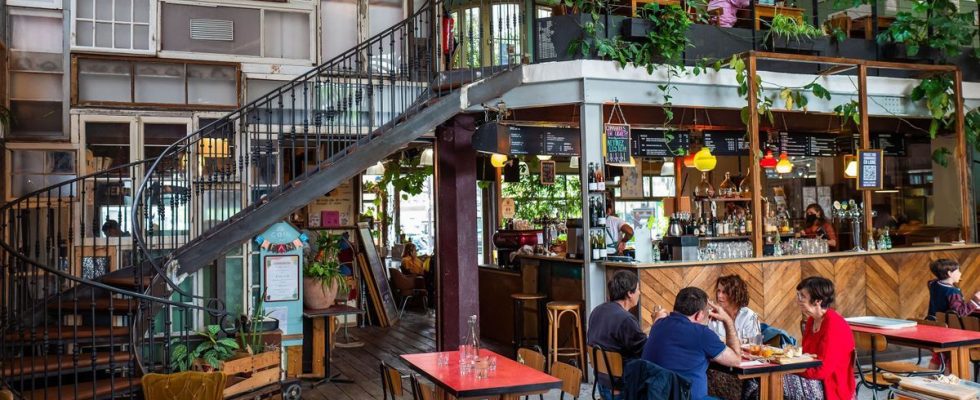Published on
Updated
Reading 3 min.
In France, the number of third-party locations has increased from 2,500 to more than 3,500 in two years according to the latest census published in September 2023. Benchmarks for associations, craftsmen or very small businesses which find a suitable place to pool their skills and convey messages, often of a social nature, these new addresses open to all audiences often include a restaurant, such as at REcyclerie in Paris. We explain to you with Marie-Eugénie Chanvillard, eco-cultural project manager of the REcyclerie.
Why did you integrate the café-canteen model into your third-place concept?
Marie-Eugénie Chanvillard : It is our economic engine. It allows us to collect cash in order to set up free programs for the public in line with our message around respect for the environment. We want to support all audiences in the ecological transition. La REcyclerie is a company with a social and solidarity mission.
What does your food offering consist of?
Our offer is 75% vegetarian and we can offer 100% vegan when a theme is suitable. We no longer offer beef on the menu. Pork is the most commonly served animal protein. We avoid fish for the simple reason that it is difficult to serve products from responsible fishing that are financially accessible on the menu. We also employ a pastry chef who makes all the desserts for the entire week and weekend. Furthermore, we only serve filter coffee. In terms of suppliers, we choose producers who are less than 250 km away. On site, we have a team that cooks and follows the instructions of our executive chef.
To implement your actions in favor of the environment, you could have found other resources than restoration. Why this choice ?
The conviviality generated by the acts of drinking and eating is crucial in the philosophy of our project. Beyond the financial aspect, food is an important vector when talking about ecology. Our food is sustainable and responsible. Our approach is also validated by the Ecotable label which recognizes seasonal and local cuisine. And then, we are in France and we know that even at the table, we continue to talk about food when we are swallowing it. There’s no better place than the table to start a conversation around sustainable food.
You were talking about sending messages through food. Doesn’t food find more social status in the context of a third place like yours?
Quite. We consider that the social is part of the ecology. Even if our main mission is not to do social work, one cannot go without the other. Since the opening of the REcyclerie, we have been working with the La Cloche association and its Carillon program which allows people in need to recover a ‘suspended’ coffee or tea (a coffee is purchased then left waiting, until until someone decides to take it, editor’s note). It’s built into our model. And then, our spaces are arranged to be social. We installed large wooden tables reminiscent of Berlin beer gardens to encourage conviviality. We want to encourage consumers to share their table. In this way, we also break down the concept of the restaurant. Today we no longer have to read a book in a library or watch a film in a cinema. Certain uses must be decompartmentalized so that other people can have access to them. We claim to be an eco-cultural place. We want to ensure that culture goes beyond the usual cultural places which are sometimes reserved for an elite or certain Parisian districts. We are located in a priority district of Paris. And this allows you to find ecology in a place where you don’t necessarily find it.
How can the use of the restaurant be decompartmentalized, in your opinion?
Just look at the neighborhood parties. All you have to do is set up a refreshment bar, a few tables and a few chairs in the street, the children will have fun! The place is not usual for sharing a drink, so in this way we take the restaurant out of its usual setting. And I think that the French also want this in the times of crisis that we are experiencing. They want to be in new places, in places that don’t remind them of the brewery. They look for places out of time, out of the ordinary and embodied. At the REcyclerie, there is no table service, we will help ourselves. We feel like home. We are no longer in the stuffy side of the restaurant. It also shows that a place like this can be accessible and uninhibited.
